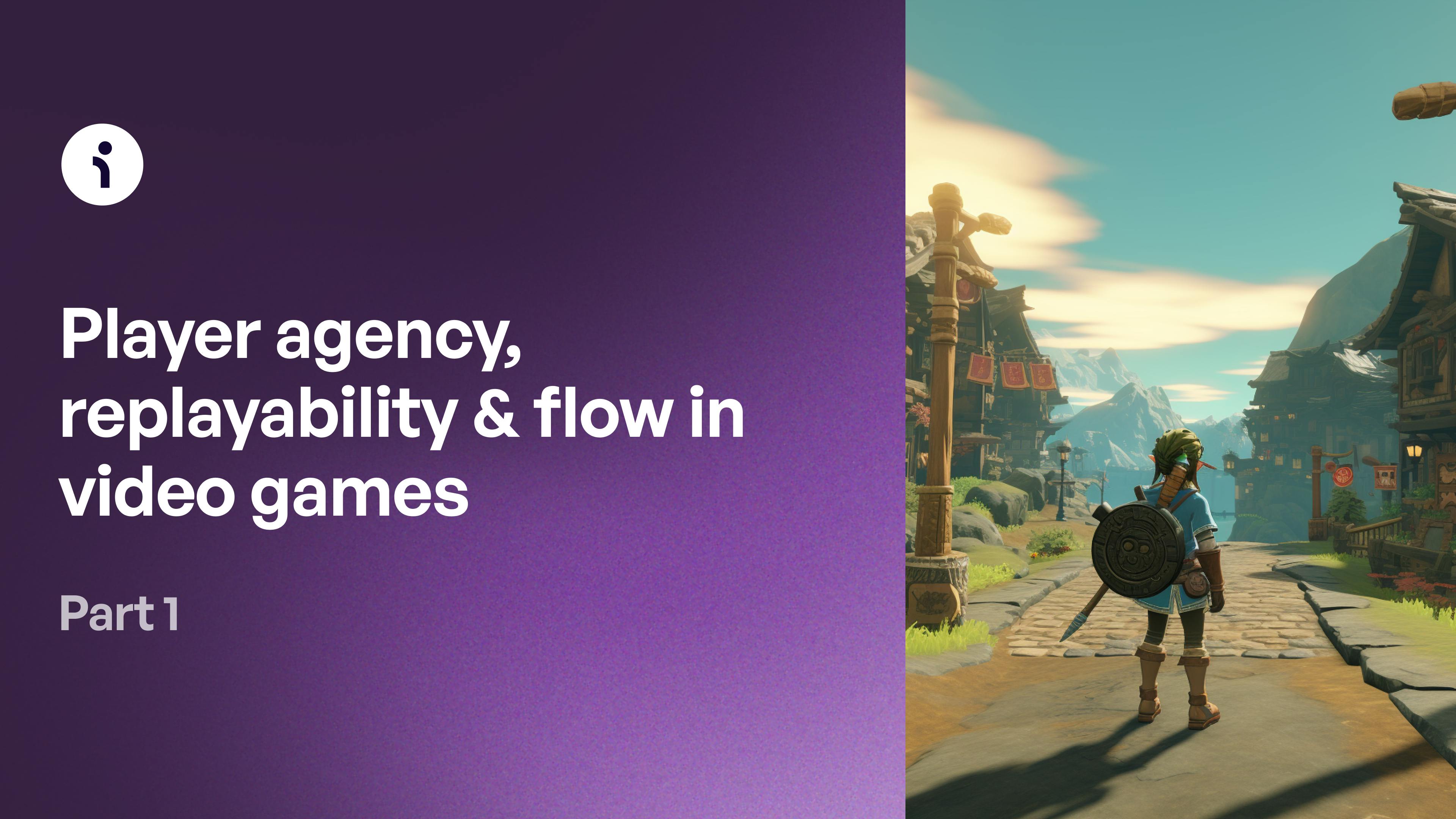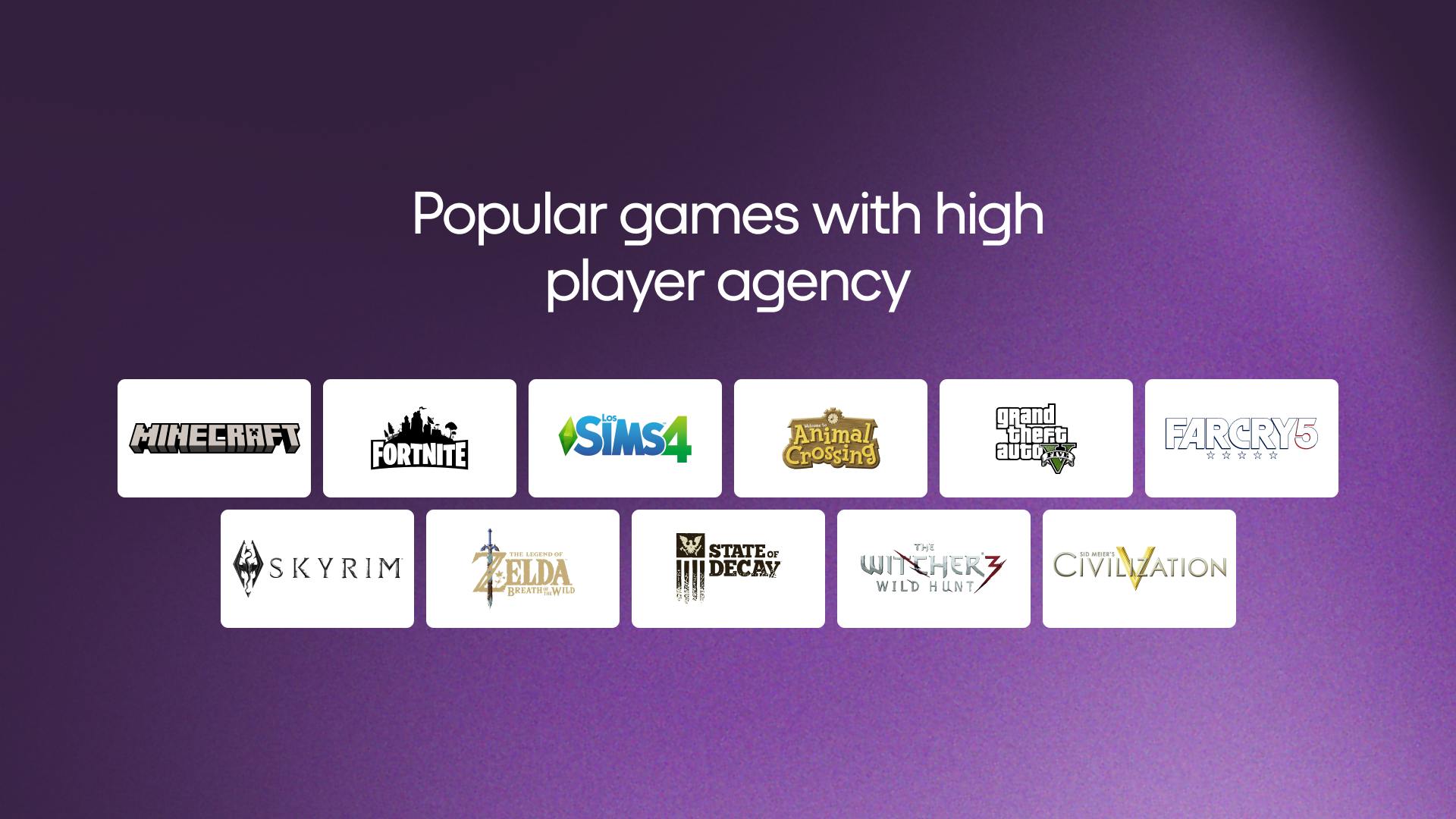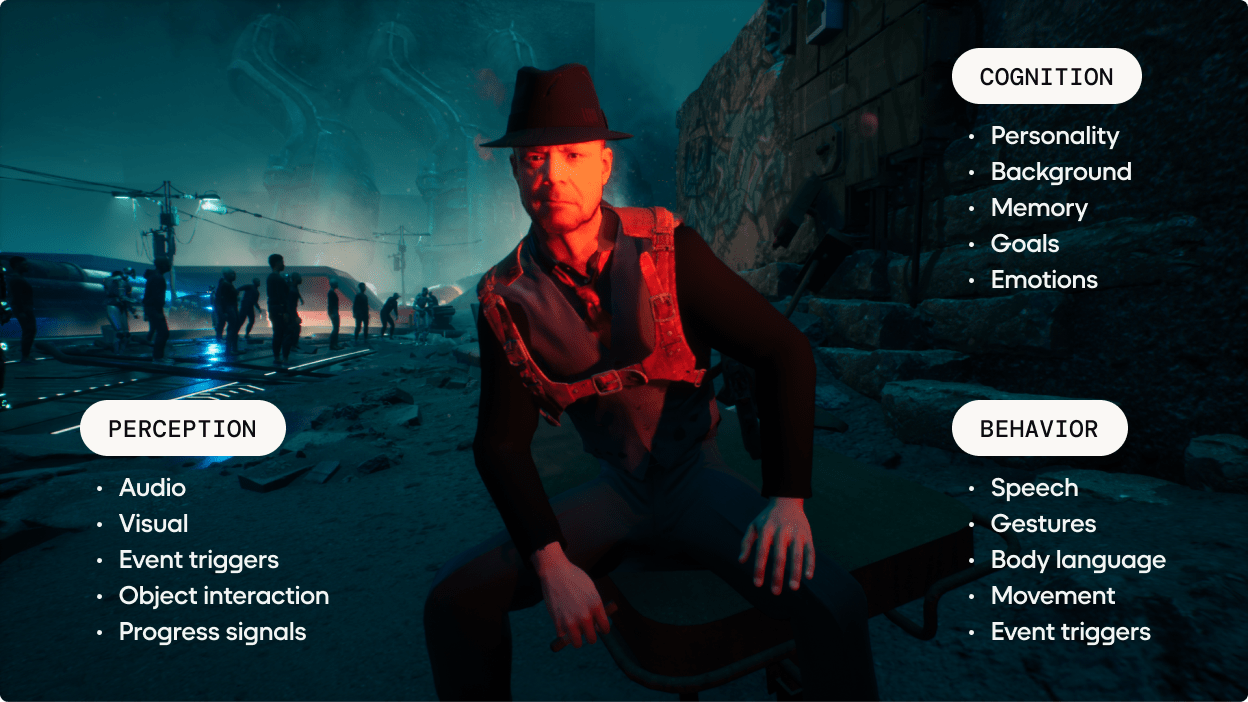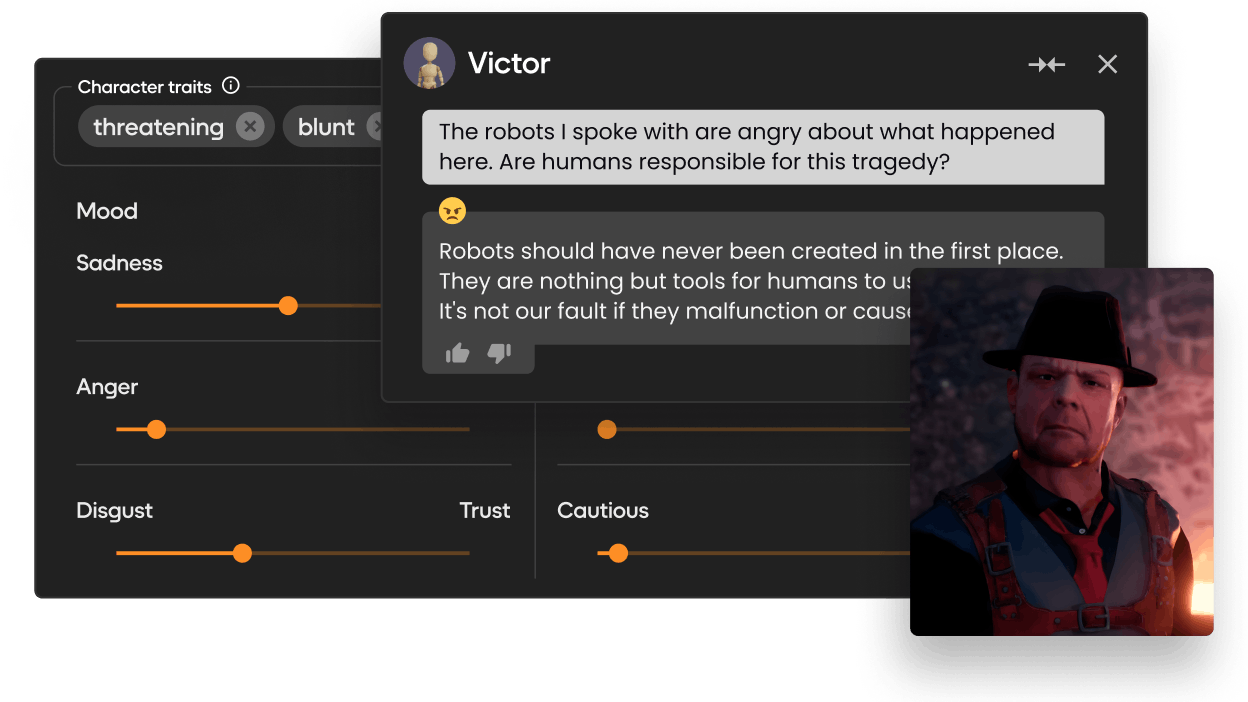Check out what's new:
Player agency, replayability & flow in video games
In this first part of this three part series, we’ll dive into the research around game narratives and player agency and identify ways AI NPCs are poised facilitate replayability and engagement than ever before.

This is part 1 of a 3 part blog series examining the impact of AI NPCs on game narratives and narrative design. In this post, we examine the impact of player agency on replayability and experiences of flow in video games. Read Part 2 and Part 3.
In an industry where experts estimate between 80% and 90% of players don’t finish the games they start, compelling game narratives are often seen as crucial in improving that metric. A 2007 cyberpsychology study looking at time loss in video games found that games with a rich game narrative were more likely to cause players to experience time loss – an experience that leads to longer session lengths, higher retention rates, and increased average revenue per user.
“I get caught up,” one survey respondent explained, “because I want to solve the current problem in order to find out more of the storyline.”
Another study similarly found that gamers’ sense of ‘presence’ in a game world with a game narrative and characters with rich personalities was rated much higher than in game worlds with minimal narrative.
Embedded, enacted & emergent narratives
But, given that game narrative is so critical to gamers, it might be surprising that the games they replay the most – like Minecraft, Skyrim, and Grand Theft Auto 5 – are either fully or partially driven by enacted or emergent narratives – two types of game narratives where gamers co-create the story through interactions with the game.
While linear pre-determined embedded narrative games may initially hook gamers, emergent and enacted narratives offer gamers more player agency – which increases replayability and long-term engagement. A 2019 study that looked at game completion rates found that while Adventure games, known for their linear embedded narratives, had a higher completion rate, it was RPGs, known for their enacted or emergent narratives, that boasted 35% longer playtimes.
“The agency given to a player on constructing their own narrative,” Game Developer wrote in a 2019 article on the subject, “is key in developing a game that will outlast its predecessors.”
AI NPCs, player agency, & player-centric narratives
With the arrival of generative AI-powered NPCs, the gaming industry is poised for a paradigm shift in player agency. That’s expected to create a new type of game narrative: player-centric narratives.
Unlike in traditional enacted or emergent narratives, where the player can only influence a limited number of game dynamics through their actions, AI NPCs radically expand the ways players are able to co-create the game narrative.
In this first part of this three part series, we’ll dive into the research around video game narratives and player agency and identify ways AI NPCs are poised to become a new mechanic that will facilitate games with infinite replayability.
Why player agency is important: Flow in video games

“When a player has the ability to construct their own narrative with a game, it not only immerses the player even more than a linear story, but allows for countless hours of replayability.” - Game Developer
Wondering why player agency matters so much when it comes to key gaming metrics like session length, retention rate, and replayability?
The explanation lies in cognitive psychology. Experiments in that field have repeatedly found an overlap between a person playing video games’ sense of agency and their experience of a flow state playing video games. Flow is categorized as a special type of immersion experience by researchers specializing in attention and agency. Flow in video games is so important to gamers, researchers claim, because of the level of absorption people experience while in a flow state and because of the level of meaning and pleasure that players attach to achieving flow states in video games.
In fact, flow in video games has been found by researchers to be responsible for causing, not just many of the positive emotions that gamers experience while playing games they like, but also a sense of time loss which leads to longer playtimes.
Video games & ‘fake’ player agency
But much of the research into player agency and flow in video games isn’t focused on gamers having ‘actual’ agency. Instead, it often talks about how much gamers ‘perceive’ themselves to have agency within highly controlled video game environments where even the choice of a branching path is (arguably) pre-determined. The stated goal of some of this research is to give game developers a road map for how to trick gamers into believing they have agency.
Developers have gone so far as to create video games that ‘fake’ agency. A great example of this is Telltale Game’s Walking Dead series where players are told a character will remember their responses or decisions and where they’re frequently forced to make decisions that are said to have important consequences. However, researchers playing the game found that, in actuality, the choices the game gave players made little to no difference on the game narrative or the gameplay.
Others have created game narratives where gamers’ choices have only a slight impact on narrative. Quantic Dream’s head David Cage calls these game narratives ‘bending stories.’ These are game narratives which stretch a little as a result of player choices but then ‘snap’ back sooner or later.
Do video games with ‘fake’ player agency satisfy gamers?
But do video games with ‘fake’ agency have the same impact on players as real agency on flow in video games? While video games with ‘fake’ agency impact the game and can increase a video games’ sense of agency even in strictly linear narrative games, the research shows that gamers, unsurprisingly, feel more player agency in video games where their choices are more meaningful.
A 2014 study out of the University of Utah found that players reported feeling higher levels of player agency in video games when they were able to make choices within games that resulted in meaningfully different game narratives and states, versus those with less impact – presumably leading to players achieving a deeper flow state in video games with more player agency. Those games are also more likely to be games with high replayability because gamers can experience the game differently just by making different choices.
In fact, players can get frustrated if you give them false choices. “I think my biggest annoyance,” explained one study participant in a paper on video games and sense of agency, “ is giving me choices that very obviously don't matter and you are just giving me a choice to give me a choice.”
This is a huge departure from how gamers described experiences where they felt high player agency in video games in similar studies: “I really enjoyed that you could just wander around this immersive environment, you could control which quest to take on next.”
The perception that video games gave fake agency to players has led to player outcry in the past. “Many people complained about Mass Effect 3’s conclusion because they felt it was abrupt and distressing… They say it throttled the series’ trademark freedom of choice,” wrote Kotaku’s Stephen Totilo in 2012. The problem was that players were offered choices throughout the game and when the ending failed to reflect those choices, fans were upset at the video game’s fake agency.
Player agency in video games: Why not make it real?

So, why don’t game devs give gamers more player agency in games – especially when it’s more likely to lead to flow states and games with high replayability? Some think too much player agency could interfere with the game’s narrative.
A 2021 study out of the University of California, Santa Cruz explains the hesitation around extending too much agency in video games like this: “[The] conflict centers around the assumption that unrestricted player agency was highly desirable, which creates an inherent dilemma for narrative-driven gameplay where the author (or computational system) may be reluctant to relinquish control over narrative progression.”
Other game researchers, however, argue that the issue is the cost of enabling more player agency in games – where every meaningful branching path requires additional development, writing, and production work. “It is often the case that a game gives the player control over their minute-to-minute actions (e.g., with combat or upgrade paths for equipment),” explains Computer Scientists Tom Cole and Marco Gillies, “but allows them little to no effect on the narrative or interaction with and/or development of NPCs. This is common in triple-A games, where it simply costs too much to develop material/assets to make content that might never be seen, leading to games that usually play out, more or less, the same each time.”
Player agency in games and AI NPCs

With AI NPCs, both the challenge of giving players agency in games without interfering with narrative progression and the challenge of adding player agency without significant extra costs and development time can be solved.
Gamers also like the idea of interacting with AI NPCs. Research we conducted with 1,000 gamers showed:
- 99% felt AI NPCs would enhance gameplay
- 78% felt like they would spend more time playing
- 79% would be more likely to buy a game
In the next post in this series, we’ll explore the ways AI NPCs create player-centric narratives helping gamers achieve a flow in video games and creating, not just games with high replayability, but games with infinite replayability.
Then, in the third post of this three part series, we’ll look at how AI NPCs and player-centric design will shift narrative design – and give examples of what that will look like in games with embedded narratives, emergent narratives, and enacted narratives.
Curious about AI NPCs? Check out our Case Studies to see how they’ve been used in games – and contact us today to get started!